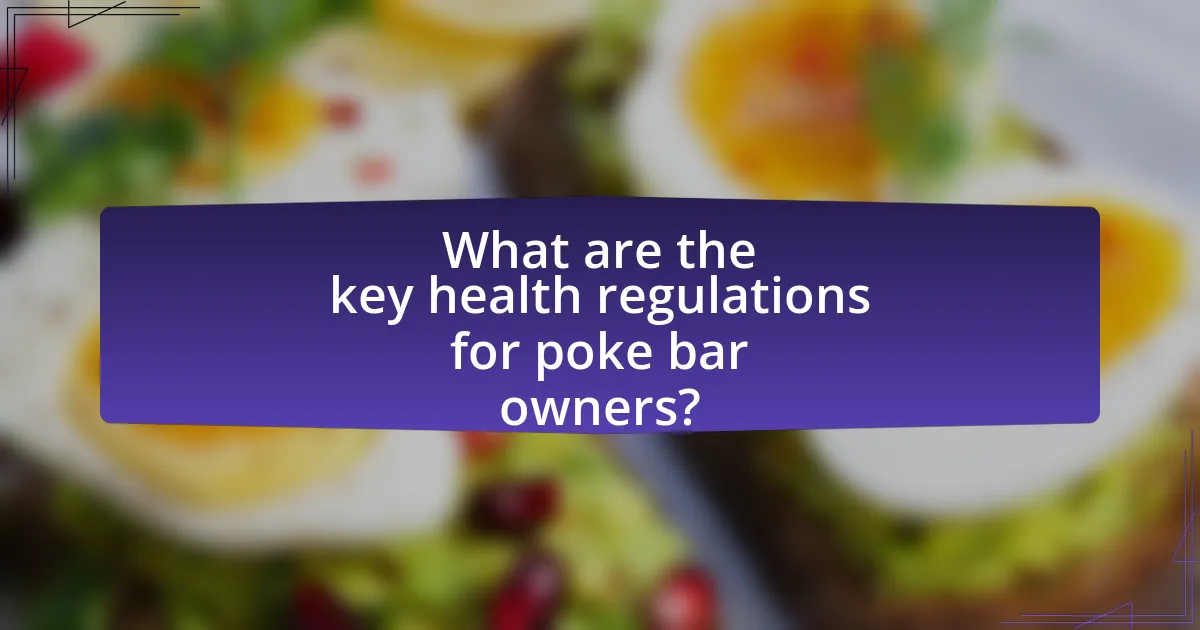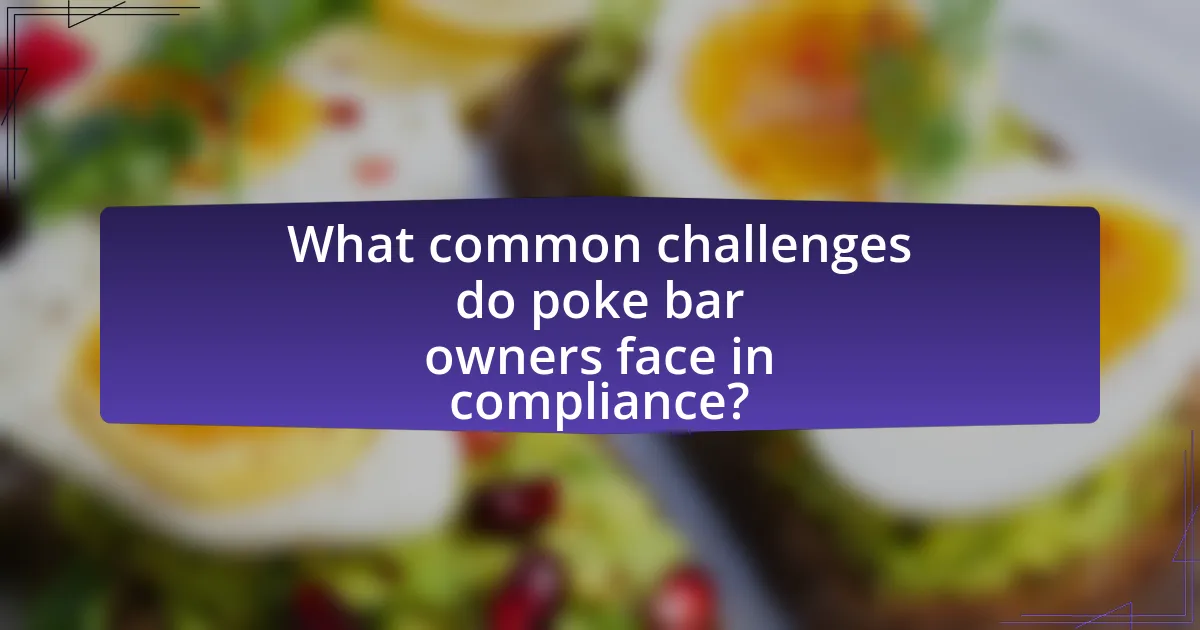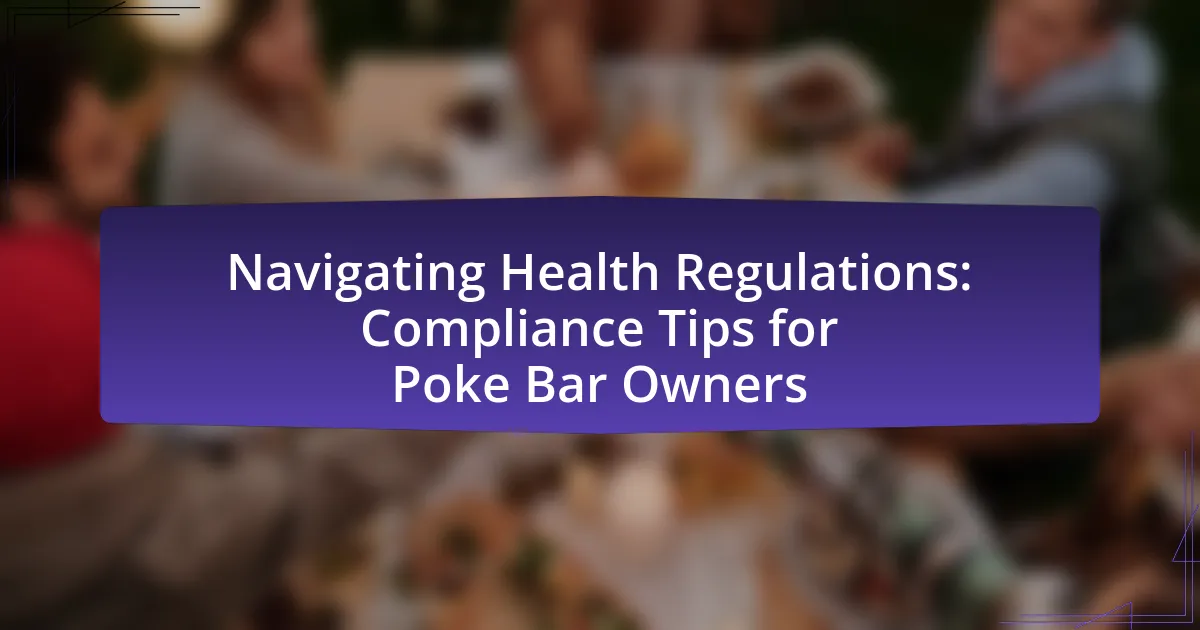The article focuses on the essential health regulations that poke bar owners must navigate to ensure compliance and maintain food safety. Key topics include the importance of adhering to local health codes, best practices for food safety, and the necessary documentation for compliance. It highlights the potential consequences of non-compliance, such as legal penalties and reputational damage, while providing practical tips for ongoing adherence to health standards. Additionally, the article discusses resources available for poke bar owners to stay informed about regulatory changes and improve their operational practices.

What are the key health regulations for poke bar owners?
Key health regulations for poke bar owners include maintaining proper food safety practices, ensuring the cleanliness of food preparation areas, and adhering to local health department guidelines. Food safety practices involve regular handwashing, proper food storage temperatures, and preventing cross-contamination between raw and cooked ingredients. Cleanliness of food preparation areas requires frequent sanitization of surfaces and equipment. Local health department guidelines often mandate obtaining necessary permits, conducting regular inspections, and following specific regulations regarding seafood handling, as poke bars frequently serve raw fish. Compliance with these regulations is crucial for ensuring customer safety and avoiding legal penalties.
How do local health codes impact poke bar operations?
Local health codes significantly impact poke bar operations by establishing standards for food safety, sanitation, and employee hygiene. These regulations dictate how ingredients must be stored, prepared, and served to prevent foodborne illnesses, which is crucial for maintaining customer safety and business reputation. For instance, health codes may require that raw fish be kept at specific temperatures to inhibit bacterial growth, and they often mandate regular inspections to ensure compliance. Failure to adhere to these codes can result in fines, temporary closures, or even permanent shutdowns, highlighting the importance of understanding and following local health regulations for successful poke bar management.
What specific health codes should poke bar owners be aware of?
Poke bar owners should be aware of health codes related to food safety, sanitation, and seafood handling. These codes typically include regulations from the Food and Drug Administration (FDA) Food Code, which outlines safe food preparation practices, proper storage temperatures, and hygiene standards. Additionally, local health departments may have specific codes regarding the handling of raw fish, including requirements for sourcing fish from approved suppliers and maintaining proper refrigeration to prevent foodborne illnesses. Compliance with these regulations is essential to ensure food safety and avoid penalties.
How can poke bar owners stay updated on changes in health regulations?
Poke bar owners can stay updated on changes in health regulations by subscribing to local health department newsletters and attending industry workshops. Local health departments often provide timely updates on regulatory changes, while workshops offer insights into compliance best practices. Additionally, joining industry associations can facilitate access to resources and networking opportunities that keep owners informed about evolving health standards.
Why is compliance with health regulations crucial for poke bars?
Compliance with health regulations is crucial for poke bars to ensure food safety and protect public health. Adhering to these regulations minimizes the risk of foodborne illnesses, which can arise from improper handling of raw fish and other ingredients commonly used in poke dishes. For instance, the Centers for Disease Control and Prevention (CDC) reports that seafood is a significant source of foodborne pathogens, making strict compliance essential for preventing outbreaks. Additionally, compliance helps poke bars maintain their reputation and customer trust, as consumers are increasingly aware of food safety standards. Failure to comply can result in legal penalties, fines, and even closure, further emphasizing the importance of adherence to health regulations.
What are the potential consequences of non-compliance?
The potential consequences of non-compliance with health regulations for poke bar owners include legal penalties, financial losses, and reputational damage. Legal penalties can manifest as fines or sanctions imposed by health authorities, which may vary based on the severity of the violation. Financial losses can arise from operational shutdowns during investigations or the need for costly corrective actions to meet compliance standards. Reputational damage can lead to a decline in customer trust and loyalty, ultimately affecting sales and long-term viability. For instance, a study by the National Restaurant Association indicates that 75% of consumers would avoid a restaurant with a history of health code violations, highlighting the significant impact on business performance.
How does compliance affect customer trust and business reputation?
Compliance directly enhances customer trust and business reputation by demonstrating a commitment to safety and ethical standards. When businesses adhere to health regulations, they signal to customers that they prioritize their well-being, which fosters confidence in the brand. For instance, a study by the Harvard Business Review found that companies with strong compliance programs experience a 20% increase in customer loyalty. This loyalty translates into a positive reputation, as satisfied customers are more likely to recommend the business to others. Therefore, compliance not only protects the business from legal repercussions but also builds a trustworthy image that attracts and retains customers.

What are the best practices for ensuring compliance in poke bars?
The best practices for ensuring compliance in poke bars include adhering to local health regulations, implementing proper food safety protocols, and conducting regular staff training. Poke bar owners must familiarize themselves with the specific health codes applicable to their location, which often cover food handling, storage temperatures, and sanitation practices. For instance, the FDA Food Code provides guidelines that can help ensure food safety and compliance. Additionally, maintaining a clean environment, regularly checking food temperatures, and ensuring proper employee hygiene are critical components of compliance. Regular training sessions for staff on these practices can further reinforce adherence to regulations, reducing the risk of violations and ensuring customer safety.
How can poke bar owners implement effective food safety practices?
Poke bar owners can implement effective food safety practices by adhering to strict hygiene protocols, ensuring proper food storage, and training staff on food safety regulations. Maintaining cleanliness in food preparation areas and regularly sanitizing surfaces reduces the risk of contamination. Proper food storage, including keeping raw fish at temperatures below 41°F, prevents bacterial growth. Additionally, training staff on the importance of handwashing and cross-contamination can significantly enhance food safety. According to the Food and Drug Administration (FDA), following these guidelines can reduce foodborne illnesses, which affect millions of Americans annually.
What training should staff receive regarding health regulations?
Staff should receive training on food safety practices, sanitation procedures, and local health regulations. This training ensures that employees understand proper food handling techniques, including temperature control, cross-contamination prevention, and personal hygiene standards. According to the U.S. Food and Drug Administration (FDA), foodborne illnesses can be significantly reduced through proper training and adherence to health regulations, which is critical for maintaining compliance and ensuring customer safety in a poke bar setting.
How can poke bar owners create a culture of compliance among employees?
Poke bar owners can create a culture of compliance among employees by implementing comprehensive training programs focused on health regulations and operational standards. These training programs should include regular workshops and assessments to ensure that employees understand the importance of compliance and the specific regulations that apply to food safety, such as proper handling of raw fish and hygiene practices.
Additionally, establishing clear policies and procedures, along with consistent communication about compliance expectations, reinforces the importance of adherence to regulations. For instance, using visual aids like posters in the workplace can serve as constant reminders of best practices.
Moreover, incentivizing compliance through recognition programs can motivate employees to prioritize adherence to health regulations. Research indicates that organizations with strong compliance cultures experience fewer violations and improved employee morale, which supports the effectiveness of these strategies.
What documentation is necessary for health regulation compliance?
Health regulation compliance requires several key documents, including health permits, food safety certifications, employee training records, and inspection reports. Health permits are issued by local health departments and are essential for operating a food establishment legally. Food safety certifications, such as ServSafe, demonstrate that staff are trained in safe food handling practices. Employee training records provide evidence that employees have received necessary training on health regulations. Inspection reports from health authorities confirm that the establishment meets required health standards. These documents collectively ensure that a poke bar operates within legal health guidelines and maintains food safety.
What types of records should poke bar owners maintain?
Poke bar owners should maintain records related to food safety, inventory management, employee training, and financial transactions. Food safety records include temperature logs, cleaning schedules, and health inspection reports, which are essential for compliance with health regulations. Inventory management records track the sourcing and usage of ingredients, helping to ensure freshness and minimize waste. Employee training records document food handling practices and safety protocols, which are crucial for maintaining a safe working environment. Financial transaction records, including sales and expenses, are necessary for effective business management and tax compliance. These records collectively support operational efficiency and adherence to regulatory standards.
How can proper documentation aid in inspections and audits?
Proper documentation aids in inspections and audits by providing clear, organized evidence of compliance with health regulations. This documentation includes records of food safety practices, employee training, and maintenance schedules, which inspectors review to verify adherence to standards. For instance, a study by the Food and Drug Administration (FDA) highlights that establishments with comprehensive documentation are less likely to receive violations during inspections, as it demonstrates proactive management of health protocols. Thus, maintaining accurate records not only facilitates smoother inspections but also enhances overall operational accountability.

What common challenges do poke bar owners face in compliance?
Poke bar owners commonly face challenges in compliance with health regulations, particularly regarding food safety standards, ingredient sourcing, and employee training. Food safety standards require strict adherence to guidelines for handling raw fish and other perishable items, which can be complex due to varying local regulations. Ingredient sourcing poses challenges as owners must ensure that all seafood is sustainably sourced and meets safety standards, which can be difficult to verify. Additionally, employee training is crucial, as staff must be knowledgeable about food handling practices and compliance requirements, often necessitating ongoing education and monitoring to maintain standards.
How can poke bar owners overcome staffing challenges related to health regulations?
Poke bar owners can overcome staffing challenges related to health regulations by implementing comprehensive training programs focused on food safety and compliance. These training programs ensure that staff are well-versed in health regulations, which can reduce the risk of violations and enhance operational efficiency. According to the Food and Drug Administration (FDA), proper training can significantly decrease foodborne illnesses, thereby fostering a safer environment for both employees and customers. Additionally, utilizing technology such as scheduling software can help streamline staffing processes, ensuring that trained employees are available during peak hours to maintain compliance with health regulations.
What strategies can be employed to ensure all staff are knowledgeable about regulations?
To ensure all staff are knowledgeable about regulations, implementing comprehensive training programs is essential. These programs should include regular workshops, online courses, and hands-on training sessions that cover specific health regulations relevant to poke bar operations. For instance, the Food and Drug Administration (FDA) provides guidelines that can be integrated into training materials to ensure compliance with food safety standards. Additionally, creating a culture of continuous learning through regular updates and refresher courses can reinforce knowledge retention among staff. Research indicates that organizations with structured training programs see a 30% increase in compliance rates, highlighting the effectiveness of such strategies in maintaining regulatory knowledge.
How can poke bar owners manage time effectively to focus on compliance?
Poke bar owners can manage time effectively to focus on compliance by implementing structured operational procedures and utilizing technology for monitoring. Establishing clear protocols for food safety, employee training, and regular audits allows owners to streamline compliance tasks. For instance, using digital checklists and compliance management software can automate tracking of health regulations, reducing manual oversight. Research indicates that businesses employing technology for compliance management can save up to 30% of time spent on regulatory tasks, allowing owners to allocate more resources to maintaining standards and ensuring adherence to health regulations.
What resources are available for poke bar owners seeking compliance assistance?
Poke bar owners seeking compliance assistance can access resources such as local health department guidelines, industry associations, and online compliance toolkits. Local health departments provide specific regulations and requirements for food safety, while industry associations like the National Restaurant Association offer resources tailored to restaurant compliance. Additionally, online toolkits from organizations such as the Food and Drug Administration (FDA) include checklists and best practices for maintaining health standards. These resources are essential for ensuring adherence to health regulations and minimizing risks associated with food safety.
Which local agencies can provide guidance on health regulations?
Local health departments provide guidance on health regulations. These agencies are responsible for enforcing public health laws and ensuring compliance with health standards. They offer resources, training, and support to businesses, including poke bars, to help them adhere to local health codes and regulations.
What online resources or organizations offer support for poke bar compliance?
The Food and Drug Administration (FDA) provides comprehensive resources for poke bar compliance, including guidelines on food safety and labeling. Additionally, the National Restaurant Association offers training programs and materials specifically designed to help restaurant owners, including poke bar operators, understand and adhere to health regulations. Local health departments also serve as vital resources, offering specific compliance information tailored to regional regulations. These organizations collectively support poke bar owners in navigating the complexities of health regulations effectively.
What practical tips can poke bar owners follow to ensure ongoing compliance?
Poke bar owners can ensure ongoing compliance by implementing regular staff training on food safety practices. This training should cover proper handling, storage, and preparation of raw fish and other ingredients, as improper practices can lead to foodborne illnesses. Additionally, owners should establish a routine for monitoring and documenting food temperatures, as maintaining safe temperature ranges is critical for preventing spoilage and contamination. Compliance with local health department regulations is also essential; owners should stay updated on any changes in laws and guidelines that affect their operations. Regular inspections and audits of food safety practices can help identify areas for improvement and ensure adherence to standards.



